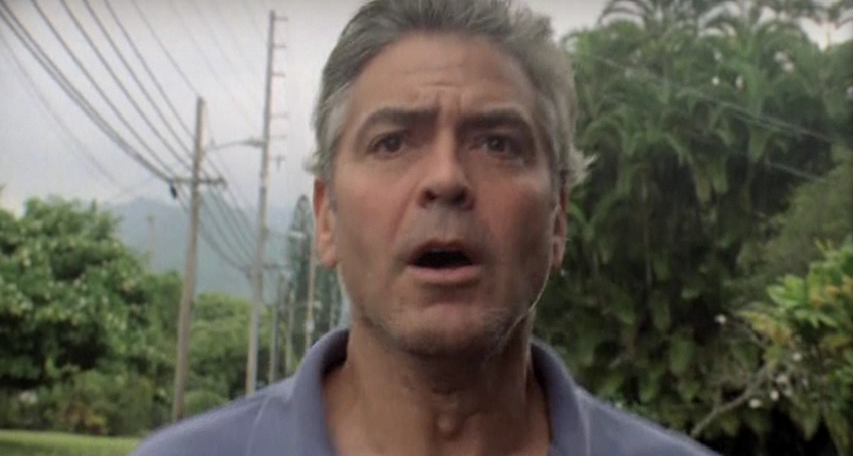Paradise With Clooney: Lost and Found

A seven-year gap is not long enough for Alexander Payne to erase his penchant for contemporary satire nor alter his signature style. With “The Descendants,” his first directorial feature since the now legendary independent hit “Sideways,” an Academy-Award winning black comedy released in 2004, the Payne formula seems to be working again. The question is: Have we had enough?
The answer might come easiest from George Clooney fans, who cannot be too upset about a movie that keeps one of the most multi-talented men in Hollywood in the spotlight during the awards season. Unlike in “The Ides of March,” the other drama he was featured in last year, Clooney is not directing or writing. Nor is he designing costumes though it would have been a breeze for “The Descendants,” where half a wardrobe of floral shirts can dress the majority of the cast. In this film Clooney plays Matt King, a lawyer who holds the destiny of an inherited, deliciously pristine land in Hawaii. The family trust nearing its ending, Matt is about to sell the property to a resort developer when a boating accident sends his wife into a coma. As the story unravels, Matt finds himself in a mishmash of conundrums, most of which concern the women in his life: his adulterous, yet currently vegetative wife, his precocious, trouble-making younger daughter and her defiant sister, illuminated by a refreshingly-grounded newcomer Shaileen Woodley. With this unexpected entourage, Matt embarks on a journey to confront his wife’s lover and the grim and sometimes complicated truths about those he holds dearest.
Payne’s ability to paint captivating characters again shines in “The Descendants.” With his co-screenwriter Nat Faxon and Jim Rash, Payne peppers the dialogue with rich, distinct personalities, allowing for a memorable ensemble performance. Yet as the poster indicates, George Clooney is the undeniable star. Clooney’s broad strokes of emotional turmoil blend well with Matt’s familial dysfunction, which is a symptom of their diminishing intimacy. Incompetent in but incomplete without his paternal and marital roles, Matt admits to being the “back-up parent,” even as he attempts to repair his lost connection with his daughters, who have grown beyond their years to assume independent if not mature identities. In a counter-intuitive but natural way, it is Matt who draws help from his children by stepping in. Clooney understands this humble, almost pitiful shift and readily embraces his character’s filial struggle between withering authority and need to bond. His portrayal is not calculated in every move, which is appropriate to Matt, who mostly doesn’t know how to handle his situation and whose emotional trajectory is marked by indecision and timidity. In one hilarious scene, Matt runs to his best friend’s house after first learning of his cuckoldry. With clumsy, hurried gaits, he tumbles and trips along but never quite falls. The scene embodies Clooney’s performance; he pushes the envelope to within a hairbreadth of messiness but still manages to keep Matt’s pace in rhythm.
Yet somewhere in the middle, Matt drifts into murky territory and leaves us only a blurred sketch. Clooney is not wholly blameless for such remoteness, but the film itself is more at fault here; “The Descendants” resorts to a relatively lackluster approach in disentangling the plot lines, by dramatizing conflict through an old landscape of moral dilemmas. We knew there would be a question of pulling his wife’s life support when all else fails; we knew he would hunt down the man his wife was sleeping with; we knew the teenagers would carry an emotional toll as the story unfolds. Payne’s unhurried pace gives a sense of evenness to the evolution of the film’s family relationships, which works well in the beginning and two thirds toward the end but becomes trite and boring in between. Thanks to the sparkling dynamics among the characters, the film does not fall into a cliché, but there are moments where it comes close.
Which brings us back to the aforementioned question: Have we had enough of the Payne formula? “The Descendants” delivers the formula in what seems like a dashing new design, yet the content remains basically unchanged. Like an old bottle of wine, “The Descendants” is a testimony to the beautiful aging of Payne’s craft, yet signs of perish have given the film shades of acidic taste, and the wowing mix of low-key narration and high-flame middle-class ethos that galvanized “Sideways” has become desaturated. This might make the film more appealing to the audience, and Payne remains a celebrated mind among indie, oh-let’s-talk-about-life filmmakers, but he might need to find something new for his next project. An idyllic setting is still a good choice, though. After all, who knew that people on “perennial vacation” have real problems, right?